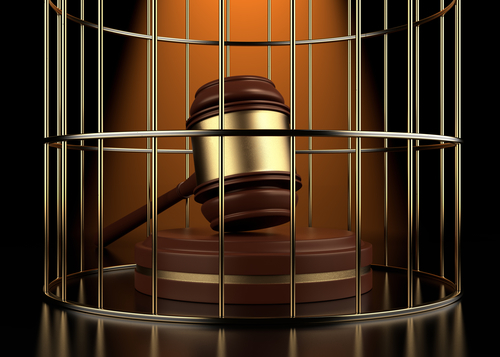
Photo: DepositPhotos.com – Gavel– © klenger
[dc]O[/dc]n Tuesday, Judge David Bunning released Rowan County Clerk Kim Davis from jail on the condition that she not interfere when her deputies sign marriage licenses.
For the few days she was in jail, Davis’ deputies, with the exception of her son, issued marriage licenses to same-sex couples and simply removed her name from the document. Before her incarceration, Davis’ attorneys had been arguing that removing her name from the license forms would be a reasonable accommodation. So now that her name is no longer going to appear on the licenses, it would seem the case is closed and life will move on.
But that’s not quite the case. While she was in jail, Davis’ attorney Mat Staver said that without her signature on the licenses, “They are not worth the paper that they are written on.”
Under Kentucky law, Staver appears to be incorrect – the licenses signed by deputies do count. Kentucky Statute 61.035 says, “Any duty enjoined by law or by the Rules of Civil Procedure upon a ministerial officer, and any act permitted to be done by him, may be performed by his lawful deputy.”
When Ms. Davis returns to work, maybe on Friday or Monday, she will likely be met by a number of same-sex couples armed with cell phone cameras seeking to obtain licenses. If she is in compliance with the conditions of her release, Ms. Davis should say “Good morning,” and step out of the way. A willing deputy should then step up, and the couples will then be licensed to go get married. Remember, the license is not the marriage itself – it is simply a certification that the couple can legally get married under the law. The officiant, often a member of the clergy, still has broad discretion whether to participate.
Davis’ attorneys are expected to press the issue that the licenses issued by deputies are illegitimate, and that Davis effectively remains in place as a gatekeeper. This would likely require her return to incarceration or Judge Bunning could order that the U.S. Marshalls could prevent her from entering her office. Either action would be significant.
The pressure on this case coming from the right is less toward accommodation and more toward trimming the wings of an “activist judiciary.”
Yesterday, I happened to catch a short interview with Mat Staver on the Glenn Beck radio program. The first thing Staver talked about was whether five members of the U.S. Supreme Court had the power to manufacture a right to same-sex marriage and how “activist judges” must be reigned in. Then he went on to talk about how Kim Davis will never give up her rights or compromise her beliefs.
Prior attempts to reign in the judiciary have included the Constitution Restoration Act proposed in 2005 by Alabama Supreme Court Justice Roy Moore, who famously refused a Federal order to remove a Ten Commandments monument from the state Supreme Court building. The Act would have enforced a new law, using Congress’ authority under Article III of the Constitution, that “the Supreme Court shall not have jurisdiction to review, by appeal, writ of certiorari, or otherwise, any matter to the extent that relief is sought against an entity of Federal, State, or local government, or against an officer or agent of Federal, State, or local government (whether or not acting in official or personal capacity), concerning that entity’s, officer’s, or agent’s acknowledgment of God as the sovereign source of law, liberty, or government.”
If this law were to pass and be found constitutional, it would severely limit civil rights in the United States.